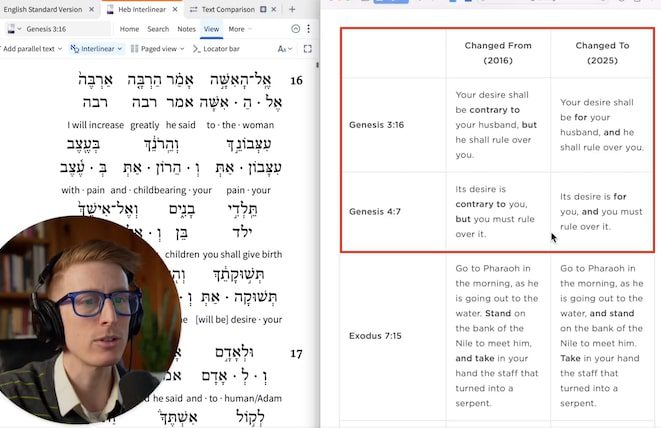The next edition of the English Standard Version (ESV) of the Bible will change Genesis 3:16 from saying, “Your desire shall be contrary to your husband, but he shall rule over you,” back to the ESV’s 2001 translation, “Your desire shall be for your husband, and he shall rule over you.” The ESV Translation Oversight Committee (TOC) announced this revision on Feb. 11, along with a number of other translation changes.
“One notable revision in this update involves Genesis 3:16 and 4:7. The committee changed the ESV 2016 translation of the Hebrew preposition ‘el from ‘contrary to’ back to the original ESV 2001 translation ‘for,’ said the TOC, “which provides a more natural translation in continuity with the historic stream of formal equivalent English Bible translations (for example, the RSV, NASB, and NKJV), and which preserves the range of interpretive options in the Hebrew.”
“The interpretive options can now be seen in the alternative renderings provided in the footnotes: ‘Or to, or toward, or against,’” the update continued. “The conjunction ‘but’ has been changed to ‘and’ in Genesis 3:16 and 4:7 so as not to impose a contrast that is not explicit in the Hebrew text.”
“As general editor for the ESV Bible, J. I. Packer (1926–2020) often reminded the committee,” said the TOC, “‘We respect readers when we pass along to them the job of interpretive work, not going beyond what the linguistic details require and not foreclosing the interpretive options.’”
English Standard Version Updates Genesis Phrasing on ‘Desire’
Genesis 3 describes Adam and Eve’s rebellion against God following the creation of the world, as well as the consequences with which God responds. After God curses the serpent, he says to the woman in Genesis 3:16 (NIV): “I will make your pains in childbearing very severe; with painful labor you will give birth to children. Your desire will be for your husband, and he will rule over you.” This is the first place this Hebrew word for “desire,” teshuqah, is used in Scripture.
Interpreting the meaning of “your desire will be for your husband” is a matter of some debate and even controversy. Some have interpreted the desire of the woman in Genesis 3:16 as a strong sexual desire or an unhealthy emotional longing.
However, one common interpretation of this passage held by many complementarians is that it describes a distortion of God’s intent that in marriage men are to lead and women are to submit to that leadership.
In this interpretation, “your desire shall be for your husband, and he shall rule over you,” means that women will try to control or dominate men but will ultimately be unsuccessful at subverting men’s leadership.
To support this view, adherents point to Genesis 4:7, the second place this Hebrew word for desire is used in Scripture. In Genesis 4, the context is that God is warning Cain that sin wants to master him. The ESV translation of Genesis 4:6-7 currently says, “The LORD said to Cain, ‘Why are you angry, and why has your face fallen? If you do well, will you not be accepted? And if you do not do well, sin is crouching at the door. Its desire is contrary to you, but you must rule over it.’”
The only other place in Scripture this word for desire is used, besides the two examples in Genesis 3 and 4, is in Song of Solomon 7 in the context of a passionate description of romantic desire. Verse 10 says, “I belong to my beloved, and his desire is for me.”

